Shopping in India (Part 1)
Ich habe ja in Indien auch diesmal so das eine oder andere gekauft und da das Einkaufen dort doch meist deutlich anders verläuft, als wir das aus Deutschland oder Europa so gewohnt sind, schreibe ich heute mal über meine Erfahrungen damit.
I did buy some stuff in India and since shopping there works quite differently from what we are used from Europe I’m writing a bit over my experience in India.
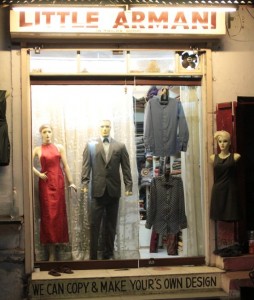 Was man zunächst mal vergessen kann sind Läden, in die man hineingeht und wo an jedem Teil ein Preisschild hängt. (Zu den Ausnahmen komme ich nachher.) Preise sind zu erfragen und eine „Kontrolle“ ob jeder Kunde den gleichen Preis gesagt bekommt gibt es nicht. (Gehen wir eher mal davon aus, daß das nicht so ist.) Auch sollte man den Gedanken an ein Textilkennzeichnungsgesetz fahren lassen, die meisten Sachen habe gar kein Label. Und wenn sie eines haben, dann steht nicht unbedingt Information darauf und wenn welche darauf steht, dann stimmt sie nicht unbedingt. Mündliche Angaben des Verkäufers sind genauso zuverlässig. Manchmal stimmt es, manchmal nicht.
Was man zunächst mal vergessen kann sind Läden, in die man hineingeht und wo an jedem Teil ein Preisschild hängt. (Zu den Ausnahmen komme ich nachher.) Preise sind zu erfragen und eine „Kontrolle“ ob jeder Kunde den gleichen Preis gesagt bekommt gibt es nicht. (Gehen wir eher mal davon aus, daß das nicht so ist.) Auch sollte man den Gedanken an ein Textilkennzeichnungsgesetz fahren lassen, die meisten Sachen habe gar kein Label. Und wenn sie eines haben, dann steht nicht unbedingt Information darauf und wenn welche darauf steht, dann stimmt sie nicht unbedingt. Mündliche Angaben des Verkäufers sind genauso zuverlässig. Manchmal stimmt es, manchmal nicht.
If you think a shop is a place where items have price tags: forget this. (Scroll down for reading about the exceptions.) You have to ask the price and there is no „control“ that every customer will get the same price. (Better assume this is not the case.) Also forget the idea that items have tags that inform you about material, content… Most things don’t have any tag at all. And if they have one it doesn’t mean it does contain any information. And if it does contain information don’t assume it will be correct.They are as correct as the oral information the vendor or shop owner will give you. Sometimes they are, sometimes not.
Meine persönliche Folgerung daraus: Ich kaufe nur Dinge, bei denen ich selber eine gewisse Warenkunde habe. Denn mein Wissen ist das einzige, auf das ich mich verlassen kann. Womit auch schon mal klar wäre, daß meine Erfahrung sich vor allem auf Textilien bezieht. Zwar ist Jaipur ein wichtiger Ort für Edelsteinhandel und vermutlich kann man alle Arten an Edelsteinen und Halbedelsteinen ganz toll dort einkaufen. Aber ich kenne mich damit gar nicht aus und kann weder die Qualität der Ware einschätzen noch, ob der Preis auch nur im Geringsten reel ist.
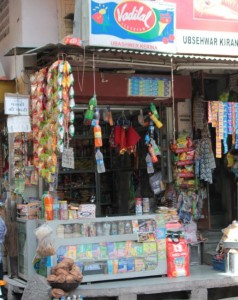 My personal consequence: I only buy things I know a bit about. Because my knowledge is the only reliable one in that situation. So my experience is mostly about buying textile stuff. Jaipur for example is a very important place in selling gemstones, but my knowledge in that field is less than limited. I can neither rate the quality of a gemstone nor can I guess if the price is anything real or not. So.. no gemstones for me.
My personal consequence: I only buy things I know a bit about. Because my knowledge is the only reliable one in that situation. So my experience is mostly about buying textile stuff. Jaipur for example is a very important place in selling gemstones, but my knowledge in that field is less than limited. I can neither rate the quality of a gemstone nor can I guess if the price is anything real or not. So.. no gemstones for me.
Das indische Geschäftsleben beruht sehr stark auf persönlichen Empfehlungen und Beziehungen. (Und nicht nur das Geschäftsleben…) Das gilt generell, nicht nur für Touristen. Das ist generell nicht mal schlecht, denn zunächst wird niemand Dinge oder Händler empfehlen, die er selber nicht gut und zuverlässig findet, denn er steht mit seinem Wort dafür ein. Als Tourist hat man aber das Problem, daß man eben in der Regel keine persönlichen Beziehungen hat. Mangel an Empfehlungen hat man keinen. Jeder Taxi- und Rikshafahrer, jeder Hotelmanager, jeder Busfahrer und überhaupt jeder den man trifft ist bereit, einem damit auszuhelfen. Oft auch ungefragt…. Gerade in Touristenzentren verdinen etliche Leute ihr Geld damit, Kunden auf der Straße anzusprechen und in ein bestimmtes Geschäft zu bringen. Wo sie natürlich am Umsatz beteiligt werden. (Der dem Preis für den Kunden aufgeschlagen wird.)
Indian business life relays a lot on recommendations and relations. (Actually… not only business life.) That is not only true for tourists but for everyone and is not the worst system you can have. Because your recommendations make your image and so people are interested only to recommend places the other part will be happy with. But as a tourist you are not part of the local society and you have no trusted social relations. You will receive recommendations anyhow, every taxi or rickshaw driver will have some, every hotel manager or bus driver… basically everyone you will meet will be happy to recommend something or someone. Especially in places with a lot of tourists there are a lot of people making money with that. They walk in the streets and try to lure tourists in a specific shop where they will receive a certain percentage of the volume of sales the customer will make. (This percentage will be simply added to the price the customer pays in the end.)
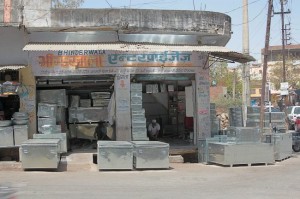 Wenn man etwas bestimmtes sucht, was nicht so einfach zu finden ist, dann muß es kein Nachteil sein, etwa an der Hotelrezeption zu fragen. Die Empfehlungen können durchaus gut und ihr Geld wert sein. Auch Restaurantempfehlungen vom Mietwagenfahrer bescheren in der Regel keine Bauchschmerzen (denn wenn der den Hotelgast mit Durchfall wieder abliefert, wird ihm das Hotel keine Gäste mehr schicken). Aber man sollte sich dennoch immer auf seine eigenen Augen, Hände, Nase,… verlassen und seine Wahl danach treffen. Wo es nur darum geht, in einen von 20 mit identischer Ware bestückten Souvenirshops geschleppt zu werden kann man hingegen eher davon ausgehen, daß man nichts besseres erhält als beim Nachbarn, sondern nur den Schlepper zusätzlich bezahlt. Da ist ein energisches „Nein“ und Weitergehen sinnvoller. Aber selbst wenn man einen Laden betritt… Nie vergessen: Es gibt keine Verpflichtung, die Ware zu kaufen, wenn dir nichts gefällt, dann geh einfach wieder! Egal wie frustriert der Blick ist, den der Händler aufsetzt. Der weiß, daß das zum Geschäft gehört. Genau wie sein trauriger Blick. 😉
Wenn man etwas bestimmtes sucht, was nicht so einfach zu finden ist, dann muß es kein Nachteil sein, etwa an der Hotelrezeption zu fragen. Die Empfehlungen können durchaus gut und ihr Geld wert sein. Auch Restaurantempfehlungen vom Mietwagenfahrer bescheren in der Regel keine Bauchschmerzen (denn wenn der den Hotelgast mit Durchfall wieder abliefert, wird ihm das Hotel keine Gäste mehr schicken). Aber man sollte sich dennoch immer auf seine eigenen Augen, Hände, Nase,… verlassen und seine Wahl danach treffen. Wo es nur darum geht, in einen von 20 mit identischer Ware bestückten Souvenirshops geschleppt zu werden kann man hingegen eher davon ausgehen, daß man nichts besseres erhält als beim Nachbarn, sondern nur den Schlepper zusätzlich bezahlt. Da ist ein energisches „Nein“ und Weitergehen sinnvoller. Aber selbst wenn man einen Laden betritt… Nie vergessen: Es gibt keine Verpflichtung, die Ware zu kaufen, wenn dir nichts gefällt, dann geh einfach wieder! Egal wie frustriert der Blick ist, den der Händler aufsetzt. Der weiß, daß das zum Geschäft gehört. Genau wie sein trauriger Blick. 😉
If you look for something special that is not so easy to find it is not the worst idea to ask at the hotel or your driver. The recommendations can be good and worth it. Also if your car driver will recommend a restaurant it normally will not make you sick (because if the driver brings vomiting guests back to the hotel, the hotel won’t send him customers again). But at the very end trust your eyes, your hands, your nose,… and your knowledge best! And if it is just the question to choose one of the 20 souvenir shops in a row which will all sell the same merchandise you can be quite sure that they are all alike and you do not need someone on the street to lure you into one. Say „no“ and ignore him and go on. And even if you enter a shop… never forget: If you don’t see anything to your liking, just leave. No matter how sad the shop owner will look. He knows it’s part of the business. Which includes his sad look….
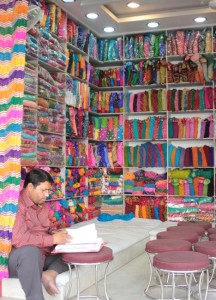 Generell wirkt das Verhalten der Ladenbesitzer für unsere deutschen Gewohneheiten immer etwas aufdringlich. Wenn man etwas genauer hinsieht, gibt es aber deutliche Unterschiede.
Generell wirkt das Verhalten der Ladenbesitzer für unsere deutschen Gewohneheiten immer etwas aufdringlich. Wenn man etwas genauer hinsieht, gibt es aber deutliche Unterschiede.
Comparing to what we are used in Germany the behavior of Indian shop owners feels always a bit pushy or obtrusive, but if you look a bit closer there are quite distinctive differences.
Ich schaue immer darauf, ob der Ladenbesitzer auf meine Wünsche eingeht. Wenn ich sage, mich interessiert rot, zeigt er mir dan vor allem rot oder wirft er mir alles vor die Nase? Wenn ich eine Tunika suche, bekomme ich Schals vorgeführt? Einem Kunden, der eine Tunika gekauft hat noch zwei oder drei Schals unter die Nase zu halten ist für indische Verhältnisse okay, auch daß der Verkäufer darauf hinweist, welche Produkte sie noch haben ist alles im Rahmen und nicht unseriös. Wenn ich aber klar sage, daß ich keinen Schal will und es nimmt kein Ende… dann wird es aufdringlich. Sprich ich gucke auch drauf, wann er mit seinen Angeboten aufhört.Im Zweifelsfall hat jeder Laden eine Tür und da kann man einfach wieder rausgehen, wenn es zu aufdringlich wird.
What I do is to check if the vendor or shop owner does listen to me. If I say I want red, will he show me red or will he mostly show me blue? If I tell I’m interested in a kurta or tunic, will he first show me is shawls or scarfs? For India it is okay to show the customer who bought a kurta also two or three dupattas (especially if they match), it’s also okay to mention other products they have. That is still within the „normal“ behavior of a reputable show owner or vendor. But if I say clearly „No, I don’t want any scarf‘ and it doesn’t stop… then it’s beyond the limit. So I check how long it takes until he stops offering things. And don’t forget: There is always the door. You can leave.
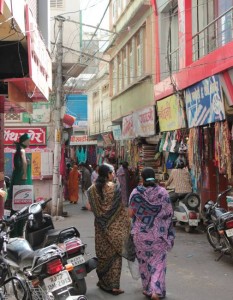 Wenn man etwas kaufen will, gibt es zwei Aspekte, auf die man achten sollte: Die Qualität der Artikel und natürlich den Preis.
Wenn man etwas kaufen will, gibt es zwei Aspekte, auf die man achten sollte: Die Qualität der Artikel und natürlich den Preis.
If you want to buy something, there are two important aspects: the quality and the price.
Aber wenn ich mir angucke, wie lang der Text schon wieder geworden ist, dann schreibe ich das lieber an einem anderen Tag fertig. Sonst kann das endgültig keiner mehr lesen… 😉
But if I check how long the text already is I better finish that on another day. This is already very long and any more would be too long to read, wouldn’t it? 😉
 In spring I had taken part in a surprise ball swap on ravelry. I did send my woolamoeba and received a ball of „Drachenwolle“ sock yarn with bamboo and silk. And I’ve knitted out all yummie gifts with the Fall of Leaves pattern. Now I have a very nice shawl.
In spring I had taken part in a surprise ball swap on ravelry. I did send my woolamoeba and received a ball of „Drachenwolle“ sock yarn with bamboo and silk. And I’ve knitted out all yummie gifts with the Fall of Leaves pattern. Now I have a very nice shawl.




